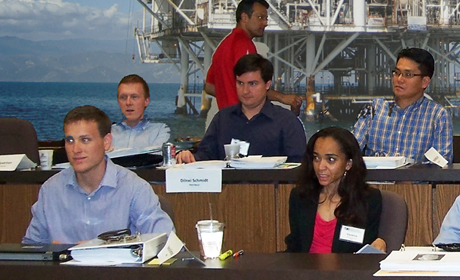Learning Never Stops for Professional Engineers
For engineers, learning doesn’t end when they receive a diploma. Requirements for continuing education, emerging technologies, and career advancement all call for further action. The Cockrell School Center for Lifelong Engineering Education (CLEE) answers that call.

CLEE’s services include face-to-face and online training on topics in civil, computer, electrical, environmental, mechanical, petroleum, and software engineering, as well as engineering business, ethics, and management. It also offers conferences and customized training for companies, and administers three weekend master’s programs.
Engineers and their employers aren’t the only ones to benefit. CLEE began more than 35 years ago as a self-sustaining unit and receives no funding from the Cockrell School. In fact, it generates a surplus. “After the 08-09 school year, the center gave roughly $1.5 million to the school of engineering,” said Cath Polito, executive director. “We pay faculty who teach in our programs, over and above their salary, and annually give money to the software engineering research center, and to the integrated circuits and systems research center, and the electrical and computer engineering department. We generated a significant surplus over the past several years and recently contributed $485,000 toward the facilities fund.”
Courses are taught by a mix of Cockrell School faculty and experts from industry. Current offerings include an online software project management course taught by practitioners, short courses for various engineering groups, online certificate programs, and the weekend master’s programs.
“The weekend master’s program allows working professionals to earn that degree without giving up their jobs,” said Polito. “As undergraduates, engineers are trained technically, but not necessarily in leadership or management skills. As they advance career-wise, they need to pick up those skills. With our master of science in engineering management, they can manage engineers and engineering projects.”
As part of its conference offerings, CLEE will host the 2011 International Conference for Indoor Air Quality, which is expected to bring in more than 1,000 participants from all over the world.
The center also develops custom education programs for the industry, around the world. Recently, Polito said, Cockrell School faculty in mechanical engineering (statistics) worked with executives at Dell Computers to create a program for the company that combined the theory of statistics with actual case studies.
Engineers who earn a master’s degree through the program sometimes continue Ph.D. work with professors they met. “The program serves as a portal in that respect,” Polito said. “Short courses are kind of a pipeline into our master’s degree. Coming back to school for a master’s once you’ve been out for a while can be intimidating, and a short course is a way to ease into it. Likewise, getting a master’s degree through one of our weekend programs can encourage students to pursue a Ph.D. It’s a huge benefit to the Cockrell School, to have someone with a Ph.D. who has a work background and can use actual work examples and real-world applications.” The real world, after all, is where engineers make a difference. CLEE does its part, one career at a time.
CLEE Upcoming Events, Courses
May 10-14 Construction Industry Institute Project Management Course I, Planning and Design
May 17-21 Construction Industry Institute Project Management Course II, Project Construction & Startup
May 18-June 22 LabVIEW Basics I and Basics II – Certification Program
June 3 Engineering Ethics
June 10 The Future of the Electricity Industry
June 6-10, 2011 International Conference for Indoor Air Quality: CLEE, with Rich Corsi, PhD Civil Engineering, will host this event in 2011, which is expected to bring in more than 1000 participants from all over the world.
For more information, visit http://lifelong.engr.utexas.edu/calendar.cfm
